Politics
Italian politics: Matteo Salvini’s comeback bid – Financial Times
When Alan Fabbri was growing up near the northern Italian city of Ferrara in the 1990s he engaged in an act of teenage rebellion that surprised his friends: he decided not to become a communist.
As a 19-year-old student he signed up to the rightwing northern separatist party the Northern League, breaking not only with the political mainstream of his staunchly leftwing region of Emilia-Romagna but also going against the traditions of his own family, some of whom had fought as partisans against Nazi Germany.
Last year he ran as the now rebranded League candidate for mayor of Ferrara and won. The result left observers across Italy stunned. A city that had been controlled by Italian left since the end of Benito Mussolini’s fascist regime — and for the majority of those 73 years by the Italian Communist party — had fallen to Matteo Salvini’s anti-migrant Italian nationalist movement.
“I got my first League membership card when I was 19 . . . I was a black sheep,” the bearded and pony-tailed 41-year-old recalls, speaking from his office near Ferrara’s 14th century Estense castle. “On my mother’s side they were communists. One of my grandfathers was illiterate but on the table he still always had a copy of l’Unità” — the communist paper founded by the Marxist theorist Antonio Gramsci in the 1920s.
“Many here used to believe people could never vote for a rightwing party because of their family traditions, but that has changed. Many ex-communists now vote League as we defend workers. The left has taken this region for granted, they thought they had already won and they were shocked.”
Now with regional elections for the legislative assembly taking place this month in Emilia-Romagna, Mr Salvini, who since taking over in 2013 has remodelled the party from its northern separatist roots to become a pan-Italian rightwing party, is aiming to stage a huge upset by seizing control of an area traditionally regarded as the spiritual home of Italian socialism.
Opinion polls are showing the rightwing coalition candidate, the 43-year-old League senator Lucia Borgonzoni, may be able to smash through Italy’s red wall. She is neck and neck with the incumbent centre-left Democratic party (PD) president of the region, Stefano Bonaccini.
PD-Five Star pact at risk
Mr Salvini is bullish. “Let it be clear, we are going to win here,” he said on the campaign trail last week in Modena. “From the 27th of January the world is going to change . . . Everyone here tells me that they used to vote communist but now they don’t any more because they are no longer communists, they are something else now”.
Should Ms Borgonzoni triumph, not only would it deal a hammer blow to the PD, it would also probably trigger a crisis in the ruling coalition with the Five Star Movement, which could threaten to bring down the government. With Mr Salvini’s party far ahead of its rivals in national polls, new elections could then see the League leader sweep to power as Italy’s prime minister.
“If the PD lose in Emilia-Romagna, it 100 per cent has the potential to bring down the national government and set Salvini on course to become prime minister,” says Daniele Albertazzi, an academic at the University of Birmingham and expert on the history of the League. “It really is too close to call.”
Victory in Emilia-Romagna would underline Mr Salvini’s rapid recovery since deciding last summer to launch the biggest political gamble of his career by bringing down his party’s then-coalition government from an Italian beach dressed in swimming trunks and with a Mojito in hand.

Soon after declaring that he was ending his alliance with the anti-establishment Five Star Movement, the League leader’s bid to force new national elections and become prime minister backfired. His spurned ex-partners struck up an unlikely pact with the PD, forming a new coalition government and banishing Mr Salvini back into opposition.
Since then, the national popularity of League has consolidated, with opinion polls consistently showing it is comfortably the most popular party in Italy. In October a centre right coalition led by the League won the central region of Umbria from the PD, with Mr Salvini immediately setting his sights on the bigger prize of Emilia-Romagna.
A talented and relentless campaigner, Mr Salvini’s return to opposition has suited him as he travels up and down Italy attacking the PD-Five Star coalition as it lurches from one political crisis to the next. A League victory in Emilia-Romagna, League politicians hope, should be enough to push Italy’s fragile coalition government over the edge.
“This coalition is already so fragile that the only thing gluing it together is their fear of Salvini,” says Erik Jones, professor of European studies and international political economy at the School of Advanced International Studies in Bologna. “If they lose it is hard to see how they make it through the spring.”
Forgetting the partisans
How did an area that for Italy’s entire postwar history has been regarded as the most dyed in the wool regione rosse — with a proud tradition of resistance to far-right politics — reach a point where Mr Salvini’s security and anti-migration platform could triumph?
“What we are seeing is a process going on, which is the same in many others parts of Europe, where people are no longer politically loyal to the identity that defined their fathers and grandfathers,” Mr Albertazzi says.
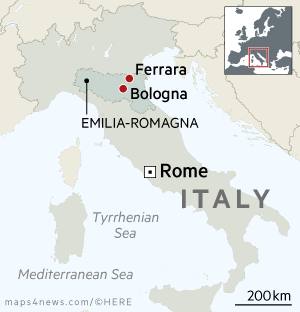
Alessio Mare, a 39-year-old bookseller from Ferrara, believes that his generation feels little connection to the experiences of the past, and this has meant many have far fewer qualms with voting for the League than their elders.
“People don’t remember any more about the partisans and the war,” he says. “Before, many people would never have dreamt of voting for the right, now they have forgotten about all that.”
Giovanni Orsina, director of the LUISS School of Government in Rome, says the communism of Emilia-Romagna always had a distinctive regional flavour that was geared more towards small entrepreneurs rather than workers in large factories. This has meant that regional concerns over immigration and the economy are not overshadowed by ideological purity.
“These people were voting communist in the past, but this was because they saw the party as a defender of their local communities and traditions,” he says. “It was very pragmatic and not particularly ideological. There is a tradition in the region of very high level of public services. But now many of these shopkeepers and artisans believe that the League will better defend their interests than the Italian left.”
Stefano Caliandro, regional co-ordinator of the PD, argues that the party has fallen victim to “anti-politics” that has seen Italian voters move away from traditional parties in favour of the League. “We have to face the rightwing wave that has hit not only Emilia-Romagna but the whole of Europe.”
Emilia-Romagna’s economy is performing strongly, posting one of Italy’s fastest regional growth rates in 2018, according to the region’s chamber of commerce, while its unemployment rate is almost half the national average. This, however has not stemmed broader national anger at economic insecurity and immigration, which Mr Salvini has tapped into.
Giorgio Bennetti, a 35-year-old sweets seller with a stall in Ferrara’s centre, believes that many voters are willing to switch to the right to express a general political dissatisfaction. Local issues, such as the collapse of the Ferrara savings bank — 130,000 investors lost their savings — have also given voters reason to want to punish the PD, which was in charge both locally and nationally when the rescue happened in 2015.
“This is a protest vote, people don’t believe that the left is working for them any more,” Mr Bennetti says. “My grandmother used to say that people have no problem changing their shirts from red to black if they need to.”
The region also suffers from a sharp divide between the wealthy centre of Bologna, the region’s largest city and home to the oldest university in Europe, and poorer and more agricultural peripheral areas where the League has been steadily building support over the past decade.

In the 2019 European elections, the League was the largest party in rural areas of Emilia-Romagna, winning 45 per cent of the vote in locations classed as “ultra periphery”, compared with less than 25 per cent for the PD in these areas, according to the Cattaneo Institute. In city centre areas, the League won 30 per cent of the vote — less than its 33.8 per cent total across the region — while the PD took 33.9 per cent, more than its 31.2 per cent regional total.
“This is a real town versus country divide,” says Mr Jones. “There used to be a sort of cultural communism, where people voted left because that was the part of society they came from. Now in Emilia-Romagna, as in other parts of Europe, it is not such a big jump for these people to vote for the right.”
Mr Fabbri says he thinks the result will hinge on voter turnout, with a higher turnout helping the League and hurting the PD.
“It is difficult to win, but the politics of Emilia-Romagna is that the League gets votes in the rural areas, in the city centres not so much,” he says. “If the turnout is high, we win. People who want change, they go out to vote”.
Stronghold no more
Whatever the result, the days of Emilia-Romagna as a communist stronghold are long gone. The Italian Communist party had by the 1990s effectively become a social democratic party, eventually being absorbed into the PD while a small rump of hardliners established fringe spin-offs.
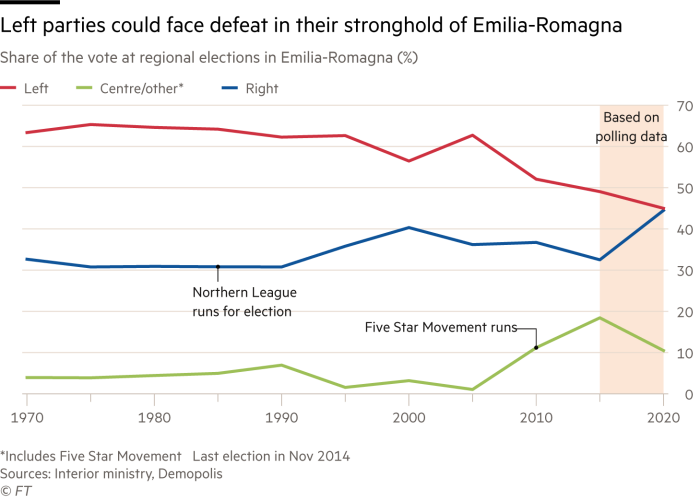
Some activists, however, are still fighting on. Pavel Rizzo, 19, is out on a central street in Ferrara with his friend Matteo trying to sell copies of Lotta Communista, a communist newspaper, to passing shoppers. He joined the movement three months ago.
“We are Leninists,” he declares with a proud smile, while acknowledging that few of the passers-by are showing much interest in buying his newspaper, which on its front page has a dense essay entitled, “The theoretical-political and social fragility of the liberal order”.
Mr Rizzo says he wishes more people would become involved in communist politics like him, but it is an uphill struggle to get them engaged. “The world has changed,” he says.
Additional reporting by Davide Ghiglione in Rome
Politics
Politics Briefing: Labour leader targets Poilievre, calls him 'anti-worker politician' – The Globe and Mail

Hello,
Pierre Poilievre is a fraud when it comes to empowering workers, says the president of Canada’s largest labour organization.
Bea Bruske, president of the Canadian Labour Congress, targeted the federal Conservative Leader in a speech in Ottawa today as members of the labour movement met to develop a strategic approach to the next federal election, scheduled for October, 2025.
“Whatever he claims today, Mr. Poilievre has a consistent 20-year record as an anti-worker politician,” said Bruske, whose congress represents more than three million workers.
She rhetorically asked whether the former federal cabinet minister has ever walked a picket line, or supported laws to strengthen workers’ voices.
“Mr. Poilievre sure is fighting hard to get himself power, but he’s never fought for worker power,” she said.
“We must do everything in our power to expose Pierre Poilievre as the fraud that he is.”
The Conservative Leader, whose party is running ahead of its rivals in public-opinion polls, has declared himself a champion of “the common people,” and been courting the working class as he works to build support.
Mr. Poilievre’s office today pushed back on the arguments against him.
Sebastian Skamski, media-operations director, said Mr. Poilievre, unlike other federal leaders, is connecting with workers.
In a statement, Skamski said NDP Leader Jagmeet Singh has sold out working Canadians by co-operating with the federal Liberal government, whose policies have created challenges for Canadian workers with punishing taxes and inflation.
“Pierre Poilievre is the one listening and speaking to workers on shop floors and in union halls from coast to coast to coast,” said Mr. Skamski.
Prime Minister Justin Trudeau and Mr. Singh are scheduled to speak to the gathering today. Mr. Poilievre was not invited to speak.
Asked during a post-speech news conference about the Conservative Leader’s absence, Bruske said the gathering is focused on worker issues, and Poilievre’s record as an MP and in government shows he has voted against rights, benefits and wage increases for workers.
“We want to make inroads with politicians that will consistently stand up for workers, and consistently engage with us,” she said.
This is the daily Politics Briefing newsletter, written by Ian Bailey. It is available exclusively to our digital subscribers. If you’re reading this on the web, subscribers can sign up for the Politics newsletter and more than 20 others on our newsletter signup page. Have any feedback? Let us know what you think.
TODAY’S HEADLINES
Pierre Poilievre’s top adviser not yet contacted in Lobbying Commissioner probe: The federal Lobbying Commissioner has yet to be in touch with Jenni Byrne as the watchdog probes allegations of inappropriate lobbying by staff working both in Byrne’s firm and a second one operating out of her office.
Métis groups will trudge on toward self-government as bill faces another setback: Métis organizations in Ontario and Alberta say they’ll stay on the path toward self-government, despite the uncertain future of a contentious bill meant to do just that.
Liberals buck global trend in ‘doubling down’ on foreign aid, as sector urges G7 push: The federal government pledged in its budget this week to increase humanitarian aid by $150-million in the current fiscal year and $200-million the following year.
Former B.C. finance minister running for the federal Conservatives: Mike de Jong says he will look to represent the Conservatives in Abbotsford-South Langley, which is being created out of part of the Abbotsford riding now held by departing Tory MP Ed Fast.
Ottawa’s new EV tax credit raises hope of big new Honda investment: The proposed measure would provide companies with a 10-per-cent rebate on the costs of constructing new buildings to be used in the electric-vehicle supply chain. Story here.
Sophie Grégoire Trudeau embraces uncertainty in new memoir, Closer Together: “I’m a continuous, curious, emotional adventurer and explorer of life and relationships,” Grégoire Trudeau told The Globe and Mail during a recent interview. “I’ve always been curious and interested and fascinated by human contact.”
TODAY’S POLITICAL QUOTES
“Sometimes you’re in a situation. You just can’t win. You say one thing. You get one community upset. You say another. You get another community upset.” – Ontario Premier Doug Ford, at a news conference in Oakville today, commenting on the Ontario legislature Speaker banning the wearing in the House of the traditional keffiyeh scarf. Ford opposes the ban, but it was upheld after the news conference in the provincial legislature.
“No, I plan to be a candidate in the next election under Prime Minister Trudeau’s leadership. I’m very happy. I’m excited about that. I’m focused on the responsibilities he gave me. It’s a big job. I’m enjoying it and I’m optimistic that our team and the Prime Minister will make the case to Canadians as to why we should be re-elected.” – Public Safety Minister Dominic LeBlanc, before Question Period today, on whether he is interested in the federal Liberal leadership, and succeeding Justin Trudeau as prime minister.
THIS AND THAT
Today in the Commons: Projected Order of Business at the House of Commons, April. 18, accessible here.
Deputy Prime Minister’s Day: Private meetings in Burlington, Ont., then Chrystia Freeland toured a manufacturing facility, discussed the federal budget and took media questions. Freeland then travelled to Washington, D.C., for spring meetings of the International Monetary Fund and the World Bank Group. Freeland also attended a meeting of the Five Eyes Finance Ministers hosted by U.S. Treasury Secretary Janet Yellen, and held a Canada-Ukraine working dinner on mobilizing Russian assets in support of Ukraine.
Ministers on the Road: Foreign Affairs Minister Mélanie Joly is on the Italian island of Capri for the G7 foreign ministers’ meeting. Heritage Minister Pascale St-Onge, in the Quebec town of Farnham, made an economic announcement, then held a brief discussion with agricultural workers and took media questions. Privy Council President Harjit Sajjan made a federal budget announcement in the Ontario city of Welland. Families Minister Jenna Sudds made an economic announcement in the Ontario city of Belleville.
Commons Committee Highlights: Treasury Board President Anita Anand appeared before the public-accounts committee on the auditor-general’s report on the ArriveCan app, and Karen Hogan, Auditor-General of Canada, later appeared on government spending. Crown-Indigenous Relations Minister Gary Anandasangaree appears before the status-of-women committee on the Red Dress Alert. Competition Bureau Commissioner Matthew Boswell and Yves Giroux, the Parliamentary Budget Officer, appeared before the finance committee on Bill C-59. Former Prince Edward Island premier Robert Ghiz, now the president and chief executive officer of the Canadian Telecommunications Association, is among the witnesses appearing before the human-resources committee on Bill C-58, An act to amend the Canada Labour Code. Caroline Maynard, Canada’s Information Commissioner, appears before the access-to-information committee on government spending. Michel Patenaude, chief inspector at the Sûreté du Québec, appeared before the public-safety committee on car thefts in Canada.
In Ottawa: Governor-General Mary Simon presented the Governor-General’s Literary Awards during a ceremony at Rideau Hall, and, in the evening, was scheduled to speak at the 2024 Indspire Awards to honour Indigenous professionals and youth.
PRIME MINISTER’S DAY
Justin Trudeau met with Ottawa Mayor Mark Sutcliffe at city hall. Sutcliffe later said it was the first time a sitting prime minister has visited city hall for a meeting with the mayor. Later, Trudeau delivered remarks to a Canada council meeting of the Canadian Labour Congress.
LEADERS
Bloc Québécois Leader Yves-François Blanchet held a media scrum at the House of Commons ahead of Question Period.
Conservative Leader Pierre Poilievre attends a party fundraising event at a private residence in Mississauga.
Green Party Leader Elizabeth May attended the House of Commons.
NDP Leader Jagmeet Singh, in Ottawa, met with Saskatchewan’s NDP Leader, Carla Beck, and, later, Ken Price, the chief of the K’ómoks First Nation,. In the afternoon, he delivered a speech to a Canadian Labour Congress Canadian council meeting.
THE DECIBEL
On today’s edition of The Globe and Mail podcast, Sanjay Ruparelia, an associate professor at Toronto Metropolitan University and Jarislowsky Democracy Chair, explains why India’s elections matter for democracy – and the balance of power for the rest of the world. The Decibel is here.
PUBLIC OPINION
Declining trust in federal and provincial governments: A new survey finds a growing proportion of Canadians do not trust the federal or provincial governments to make decisions on health care, climate change, the economy and immigration.
OPINION
On Haida Gwaii, an island of change for Indigenous land talks
“For more than a century, the Haida Nation has disputed the Crown’s dominion over the land, air and waters of Haida Gwaii, a lush archipelago roughly 150 kilometres off the coast of British Columbia. More than 20 years ago, the First Nation went to the Supreme Court of Canada with a lawsuit that says the islands belong to the Haida, part of a wider legal and political effort to resolve scores of land claims in the province. That case has been grinding toward a conclusion that the B.C. government was increasingly convinced would end in a Haida victory.” – The Globe and Mail Editorial Board.
The RCMP raid the home of ArriveCan contractor as Parliament scolds
“The last time someone was called before the bar of the House of Commons to answer MPs’ inquiries, it was to demand that a man named R.C. Miller explain how his company got government contracts to supply lights, burners and bristle brushes for lighthouses. That was 1913. On Wednesday, Kristian Firth, the managing partner of GCStrategies, one of the key contractors on the federal government’s ArriveCan app, was called to answer MPs’ queries. Inside the Commons, it felt like something from another century.” – Campbell Clark
First Nations peoples have lost confidence in Thunder Bay’s police force
“Thunder Bay has become ground zero for human-rights violations against Indigenous Peoples in Canada. Too many sudden and suspicious deaths of Indigenous Peoples have not been investigated properly. There have been too many reports on what is wrong with policing in the city – including ones by former chair of the Truth and Reconciliation Commission Murray Sinclair and former Toronto Police board chair Alok Mukherjee, and another one called “Broken Trust,” in which the Office of the Independent Police Review Director said the Thunder Bay Police Service (TBPS) was guilty of “systemic racism” in 2018. – Tanya Talaga.
The failure of Canada’s health care system is a disgrace – and a deadly one
“What can be said about Canada’s health care system that hasn’t been said countless times over, as we watch more and more people suffer and die as they wait for baseline standards of care? Despite our delusions, we don’t have “world-class” health care, as our Prime Minister has said; we don’t even have universal health care. What we have is health care if you’re lucky, or well connected, or if you happen to have a heart attack on a day when your closest ER is merely overcapacity as usual, and not stuffed to the point of incapacitation.” – Robyn Urback.
Got a news tip that you’d like us to look into? E-mail us at tips@globeandmail.com. Need to share documents securely? Reach out via SecureDrop.
Politics
GOP strategist reacts to Trump’s ‘unconventional’ request – CNN


GOP strategist reacts to Trump’s ‘unconventional’ request
Donald Trump’s campaign is asking Republican candidates and committees using the former president’s name and likeness to fundraise to give at least 5% of what they raise to the campaign, according to a letter obtained by CNN. CNN’s Steve Contorno and Republican strategist Rina Shah weigh in.
Politics
Anger toward federal government at 6-year high: Nanos survey – CTV News
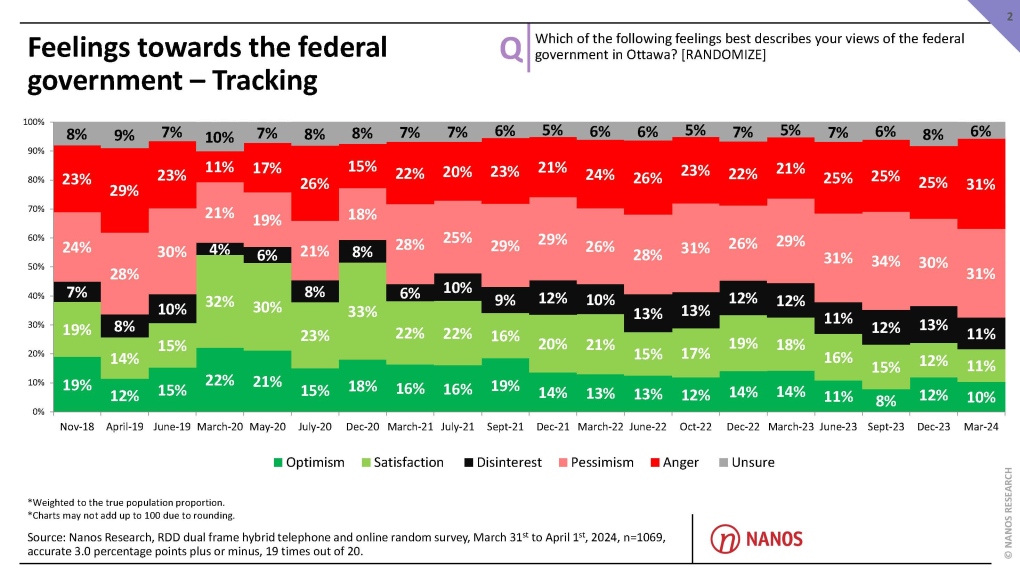

Most Canadians in March reported feeling angry or pessimistic towards the federal government than at any point in the last six years, according to a survey by Nanos Research.
Nanos has been measuring Canadians’ feelings of optimism, satisfaction, disinterest, anger, pessimism and uncertainty toward the federal government since November 2018.
The latest survey found that optimism had crept up slightly to 10 per cent since hitting an all-time low of eight per cent in September 2023.
However, 62 per cent of Canadians said they feel either pessimistic or angry, with respondents equally split between the two sentiments.
(Nanos Research)
“What we’ve seen is the anger quotient has hit a new record,” Nik Nanos, CTV’s official pollster and Nanos Research founder, said in an interview with CTV News’ Trend Line on Wednesday.
Only 11 per cent of Canadians felt satisfied, while another 11 per cent said they were disinterested.
Past survey results show anger toward the federal government has increased or held steady across the country since March 2023, while satisfaction has gradually declined.
Will the budget move the needle?
Since the survey was conducted before the federal government released its 2024 budget, there’s a chance the anger and pessimism of March could subside a little by the time Nanos takes the public’s temperature again. They could also stick.
The five most important issues to Canadians right now that would influence votes, according to another recent Nanos survey conducted for Bloomberg, include inflation and the cost of living, health care, climate change and the environment, housing affordability and taxes.
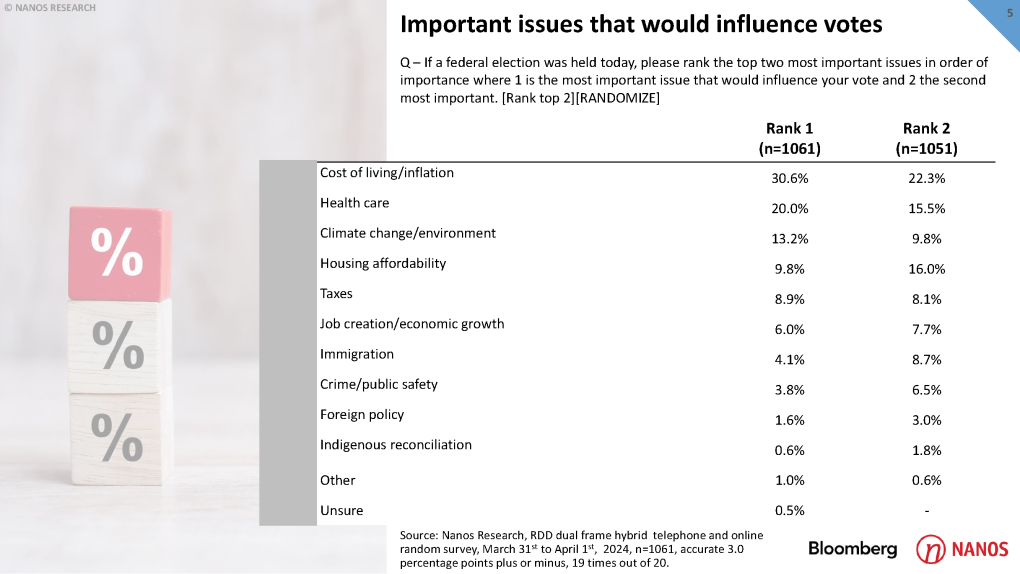

With this year’s budget, the federal government pledged $52.9 billion in new spending while promising to maintain the 2023-24 federal deficit at $40.1 billion. The federal deficit is projected to be $39.8 billion in 2024-25.
The budget includes plans to boost new housing stock, roll out a national disability benefit, introduce carbon rebates for small businesses and increase taxes on Canada’s top-earners.
However, advocacy groups have complained it doesn’t do enough to address climate change, or support First Nations communities and Canadians with disabilities.
“Canada is poised for another disastrous wildfire season, but this budget fails to give the climate crisis the attention it urgently deserves,” Keith Brooks, program director for Environmental Defence, wrote in a statement on the organization’s website.
Meanwhile, when it comes to a promise to close what the Assembly of First Nations says is a sprawling Indigenous infrastructure gap, the budget falls short by more than $420 billion. And while advocacy groups have praised the impending roll-out of the Canada Disability Benefit, organizations like March of Dimes Canada and Daily Bread Food Bank say the estimated maximum benefit of $200 per month per recipient won’t be enough to lift Canadians with disabilities out of poverty.
According to Nanos, if Wednesday’s budget announcement isn’t enough to restore the federal government’s favour, no amount of spending will do the trick.
“If the Liberal numbers don’t move up after this, perhaps the listening lesson for the Liberals will be (that) spending is not the political solution for them to break this trend line,” Nanos said. “It’ll have to be something else.”
Conservatives in ‘majority territory’
While the Liberal party waits to see what kind of effect its budget will have on voters, the Conservatives are enjoying a clear lead when it comes to ballot tracking.
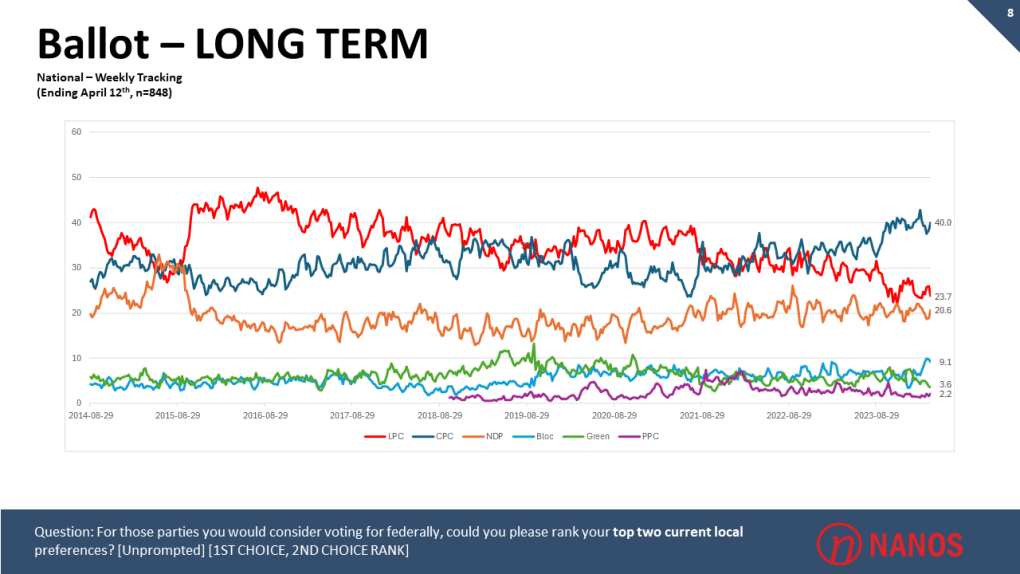

“Any way you cut it right now, the Conservatives are in the driver’s seat,” Nanos said. “They’re in majority territory.”
According to Nanos Research ballot tracking from the week ending April 12, the Conservatives are the top choice for 40 per cent of respondents, the Liberals for 23.7 per cent and the NDP for 20.6 per cent.
Whether the Liberals or the Conservatives form the next government will come down, partly, to whether voters believe more government spending is, or isn’t, the key to helping working Canadians, Nanos said.
“Both of the parties are fighting for working Canadians … and we have two competing visions for that. For the Liberals, it’s about putting government support into their hands and creating social programs to support Canadians,” he said.
“For the Conservatives, it’s very different. It’s about reducing the size of government (and) reducing taxes.”
Watch the full episode of Trend Line in our video player at the top of this article. You can also listen in our audio player below, or wherever you get your podcasts. The next episode comes out Wednesday, May 1.
Methodology
Nanos conducted an RDD dual frame (land- and cell-lines) hybrid telephone and online random survey of 1,069 Canadians, 18 years of age or older, between March 31 and April 1, 2024, as part of an omnibus survey. Participants were randomly recruited by telephone using live agents and administered a survey online. The sample included both land- and cell-lines across Canada. The results were statistically checked and weighted by age and gender using the latest census information and the sample is geographically stratified to be representative of Canada. The margin of error for this survey is ±3.0 percentage points, 19 times out of 20.
With files from The Canadian Press, CTV News Senior Digital Parliamentary Reporter Rachel Aiello and CTV News Parliamentary Bureau Writer, Producer Spencer Van Dyke
-



 Tech21 hours ago
Tech21 hours agoCytiva Showcases Single-Use Mixing System at INTERPHEX 2024 – BioPharm International
-



 Health17 hours ago
Health17 hours agoSupervised consumption sites urgently needed, says study – Sudbury.com
-
News23 hours ago
Tim Hortons says 'technical errors' falsely told people they won $55K boat in Roll Up To Win promo – CBC.ca
-



 Tech23 hours ago
Tech23 hours agoAaron Sluchinski adds Kyle Doering to lineup for next season – Sportsnet.ca
-



 Politics24 hours ago
Politics24 hours agoTrump faces political risks as trial begins – NBC News
-
News16 hours ago
2024 federal budget's key takeaways: Housing and carbon rebates, students and sin taxes – CBC News
-
Tech22 hours ago
Nintendo Indie World Showcase April 2024 – Every Announcement, Game Reveal & Trailer – Nintendo Life
-
News17 hours ago
Canada's 2024 budget announces 'halal mortgages'. Here's what to know – National Post









